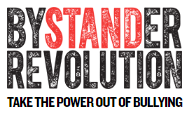Resource Links
National Resource Links
Bystander Revolution

Bystander Revolution is a website offering practical, crowdsourced advice about simple things individuals can do to defuse bullying and help shift the culture. No matter who you are or what you’re facing, you can find personal stories, suggestions, and encouragement from someone who has dealt with a similar issue. Search by problem or solution to find tips from people who have been targets, people who have been bystanders, and even people who have bullied.
Children’s Safety Network

Bullying is an aggressive behavior and a form of abuse repeated over time and involving an imbalance of power. It can be physical, verbal, or emotional and can occur via e-mail or online (cyberbullying). Prevention efforts for schools should: create anti-bullying policies and communicate them to staff, parents, and students, integrate bullying prevention material into curriculum at all grade levels and encourage students to stand up to bullies, report incidents, and support victims
Eudutopia

Edutopia is a website published by the George Lucas Educational Foundation (GLEF). Founded in 1991 by filmmaker George Lucas and venture capitalist Steve Arnold, the Foundation “celebrates and encourages innovation” in K-12 schools. Edutopia produces a series titled “Schools That Work” which profiles K-12 schools, districts, and programs that are improving the ways in which students learn. The series focuses on evidence-based successes and uses how-to videos and tip lists to help develop educational leadership. The producers interview teachers, students, principals, and administrators, and these educators share their resources such as rubrics, lesson plans, assessments, and training tools.
Health Resources and Service Administration

Bullying is an important public health issue that HRSA and its partners address in communities across the country. Whether kids bully each other in person or cyberbully using electronic technology, the results of this aggressive behavior have serious, lasting effects. Preventing bullying in all its forms can improve the physical and mental health, and the safety and well-being of children and their families. HRSA actively works to reduce bullying prevalence across the country in a variety of ways. Key to this is co-chairing the Federal Partners in Bullying Prevention (FPBP), a cross-government working group charged with coordinating federal efforts on bullying prevention.

Research shows that parents and caregivers who spend at least 15 minutes a day talking with their children or teens help build strong relationships, and prevent bullying. SAMHSA’s free KnowBullying app will help you boost your children’s confidence, resilience, and build effective strategies for facing bullying.
National Education Association Resources and Tools

This first-of-its-kind, large-scale research study by NEA and Johns Hopkins University examines different school staff members’ perspectives on bullying and bullying prevention efforts.
No Bully

Each year 30% of students are the target of bullying and cyberbullying. No Bully is an evidence based program that leverages student empathy to bring this crisis to an end. Since 2009 the non-punitive No Bully System has created bully-free schools for over 120,000 students.
PACER’s National Bullying Prevention Center

Founded in 2006, PACER’s National Bullying Prevention Center actively leads social change, so that bullying is no longer considered an accepted childhood rite of passage. PACER provides innovative resources for students, parents, educators, and others, and recognizes bullying as a serious community issue that impacts education, physical and emotional health, and the safety and well-being of students.
Preventing Bullying: Through Science, Policy, and Practice

A toolkit from the National Academies of Science, Engineering, and Medicine provides information and resources for youth, parents, school administrators, researchers, policymakers, and others.
StopBullying.gov

StopBullying.gov provides information from various government agencies on what bullying is, what cyberbullying is, who is at risk, and how you can prevent and respond to bullying.